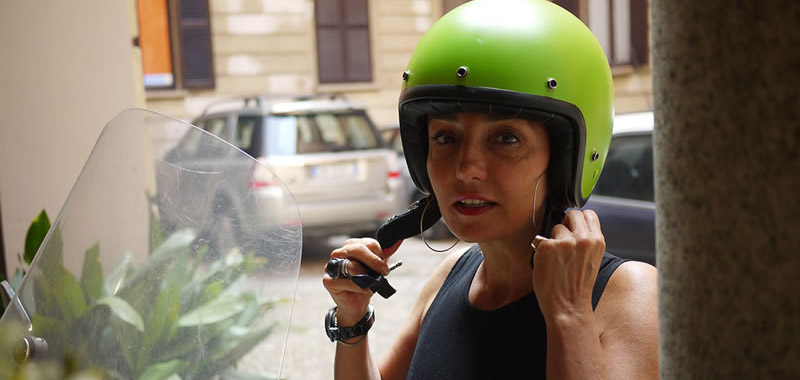
A Woman’s Place is on the Front Line: The Evolution of Female Combat Soldiers
octubre 1, 2013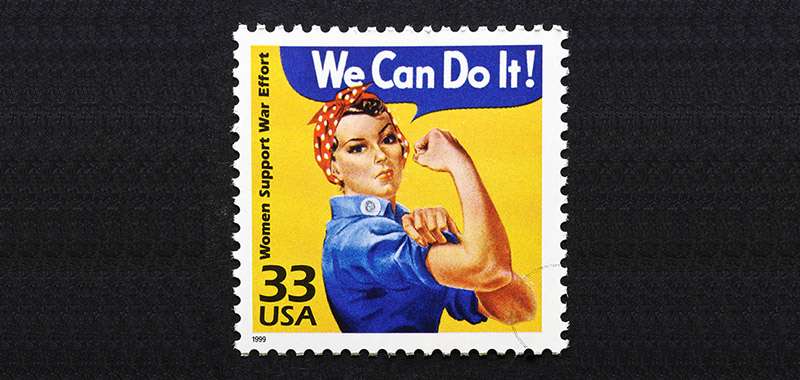
Am I a Human? A Look at the War on Women
octubre 1, 2013A client is a client and without faults, but I am a professional and if he doesn’t like my findings it’s his problem. I am not here to please or to bolster anybody’s ego, but to analyse numbers and get practical results from my research.
– Italian Pollster Alessandra Ghisleri
How does one readily summarise Alessandra Ghisleri? Her incisive intelligence and her eclectic intellectual background would make her a player to reckon with in probably any arena that she would choose. Dual degrees in oceanography and palaeontology are not the usual prerequisites for a number-crunching analyst and trend spotter. And yet Ghisleri is – bar none – the most successful opinion pollster in Italy. And her range goes well beyond just Italy or Europe; her reputation is such that her clientele is broadly international. This includes the United States, which is an arena notoriously reluctant to accept opinions from foreigners. Of course, she excels on her home turf and when the complexities of the Italian market can be bewildering to outsiders, discerning clients turn to her firm, Euromedia Research, as the definitive tool to better understand both Italy and Europe as a whole. Ghisleri is Italian, European and global in outlook.
I must confess her assertiveness and sharp speech are in contrast to the gentle image of her public persona when you first meet Alessandra Ghisleri. I could not help noticing the gigantic, old-style green receiver she has attached to her mobile phone. She is very attentive and has anticipated my questions. ‘I spend so much time on the phone I started to develop some kind of headache, so I chose this gadget to prevent me from getting more of them.’ She relayed this detail with a captivating smile that lit up her equally striking visage. She is a beautiful woman, no doubt, but her external appearance also reveals a sharpness of mind in her countenance. She is always switched on, and you see that clearly in her eyes.
She rarely gives interviews and readily admits she is not very trusting of the media. This is perhaps ironic, but because of her prominence on the Italian political scene, she feels she has been targeted and misquoted too often by some less-than-scrupulous journalists at home. So she now screens them carefully and not every reporter may gain access. Her favourite topic is her work and she avoids discussion of her personal life. And in this particular instance, as Dante unveils its first annual edition focused exclusively on Beatrice, I am pleased Ghisleri has agreed to collaborate with us.
In keeping with her objective-oriented philosophy, she responds with enthusiasm to my assertion that ‘actions speak louder than words’. I wanted to show in tangible way what she is so good at, so I asked a straightforward question.
‘How about rating the leaders of the world, as if we are a political rating agency?’ I ask her. ‘How much time do you think you need to come up with an acceptable result?’ She smiles, takes her receiver and dials a number. ‘How much time do we need to come up with result based on…?’
Over a span of ten minutes she has outlined all the variables to a colleague, including how many people will be sampled, and gives me her verdict. ‘How about mid-August?’ I am almost speechless. All of Italy is on vacation in August and even less inclined than usual to face toil, in light of the recession, during this sacrosanct time-off. So she has broken another stereotype. La Ghisleri, as she has been dubbed by the Italian press, fits into few moulds but her own.
She explains that her polls would be based on a variety of factors:
• interviews based on thirty opinion leaders
• data analysis based on political polls made in the country of the leader
data analysis based on articles of the local and international press
• manual analysis via monitoring web 2.0, realised with method SIR – Social Intelligence Research
But before we delve into the results of the findings, I can’t resist a few more questions as part of me is sceptical. All too often we read contemporary polls and accept them as inviolate when we very seldom grasp the methodology behind them. We know some are not credible and the data can be skewed and manipulated, especially in secret polls.
Ghisleri agrees with me, unleashes one more of those devastating smiles, and explains that sites that publish secret results are hilarious. She pokes fun at some of the material she constantly reads in the press: ‘We see findings from dog and horse races, or even the cycling tour of the Conclave, you name it, and suddenly you discover that this party is on the rise or a rival party is suddenly losing ground.’ She admits this is not serious work but rather a tease for the reader, trying to divert public opinion.
And can they do that?
‘Of course not” she says, laughing. ‘We’re not magicians here. We analyse real numbers and we base our findings on that, not on putting a spell on people with magic potions.’ It’s kind of charming notion, but since we are laughing at some of the secret findings how about talking seriously about human individuality? In a world where people seem incapable of doing anything without consulting opinion polls, is there still space for individuality and independence of thought and behaviour, I wonder? Ghisleri thinks that society is often dazzled by fashion, constant new trends, and mob conduct, and that precisely because of this, individuality and originality emerge to counter the conformity.
‘These are isolated personalities in comparison to the people that we analyse with our polls, but if it wasn’t like this we wouldn’t be able to analyse consumer behaviour. There will always be space for the individual even if the variables are different to the ones we had ten or twenty years ago. Statistics or opinion polls do not create anything. It is important to say this. We are not the sibyl or the oracle, as I like to say, of humanity’s inner self. We only register and study the behaviour. If, in a society we lose identity, the fault belongs to the behaviour of society itself.’
But what about the politicians who seem to live for polling and consensus-building? ‘It is true’, Ghisleri replies, ‘that the majority of politicians are easily influenced and subject to direction of the opinion polls. It is like that all over the world. The difference is in the quality of the politician. The superficial one follows the numbers literally whilst the man of substance turns it into his own advantage for his own objectives. Therefore, space for a leader’s originality still exists, as long as the political leader has it within him. We cannot create substance if there is nothing there. Without a good product the campaign does not sell, and we cannot do a hard sell if it’s without merit.’ I remark that it is a bit pathetic that politicians and business enterprises alike have adopted this methodology to grasp their failings and then use it as a smokescreen to justify their actions.
‘In reality the opinion poll and the statistics should be used as a comprehensive measurement, not as predictions. We are not shamans; we are researchers, people that study numbers. Therefore the market research and opinion polls should be the intermediate process before the final decision. We provide tools for the politician to create consensus or for the business to become more viable financially and commercially.’ Have you ever been surprised by some findings?
‘The opinion polls are instruments that capture a picture of key factors in society to determine the reaction to a myriad of questions at a specific moment in time. Therefore in many instances correlating the findings with respect to political results or economic trends has to be done with a balanced perspective which considers a multitude of variables that are often fluid. Failing to make the correct interpretation of the findings could lead to a different result. However, yes, I was surprised to see in a study we made for a prominent French political figure, that the French are quite attentive to the physical posture of their leader, literally how one carries oneself. And odd as it may seem, this can swing opinion dramatically. This may be culturally idiosyncratic to the French, but overall in the current worldwide political turmoil even a small percentage-point shift can determine victory or defeat in an election.’
And yet I cannot help but ponder… could our very own Leonardo da Vinci, the ultimate Renaissance man, exist today in a world where key decisions seem to be directed excessively by opinion polls and statistics? In response, Ghisleri poses her own question.
‘Are we really sure that opinion polls have this power? Manipulating and directing our behaviours? We saw in our recent elections that Prime Minister Monti hired Obama’s campaign guru and failed miserably at the polls. The same opinion poll used by Leonardo or Napoleon – would it truly be utilised in the same way? Would we share the same aim? I have serious doubts about it! The polls by themselves do not create anything. The same result given and analysed by different analysts in a different way does not produce the same results. Did Napoleon, before the final battle in Wagram, study the combativeness of his adversary (desk research), consult with his lieutenants for the best ideas (focus group), and analyse the whole structure for the best actions (reading of the data)? Napoleon displayed great tactics in problem-solving as to how best to deploy his artillery to overcome the enemy; he took to the field and won.’
If you haven’t deduced yet why Alessandra Ghisleri has become the most powerful woman in Italy, perhaps a sample of her polls – exclusively commissioned for Dante – will do the trick. Her polling figures for incumbent German Chancellor Angela Merkel give Merkel a triple AAA rating, so as we go to press the election results will confirm their accuracy or not. Ghisleri is not daunted by the prospect.
‘I’m not afraid to face a battlefield myself; taking risks is part of my daily routine. You can publish my findings without any reservations or problems. You’ll see.’ Given her fearlessness, unflinching confidence and enviable, proven track record as one of the most accurate prognosticators in the business, the talented, beautiful and uncompromising Alessandra Ghisleri is a self-made woman, navigating Italian and European politics on her own terms. Dante will watch her progress closely and we expect you will too.
Dante’s Poll Results
FOCUS ON INDIVIDUAL LEADERS
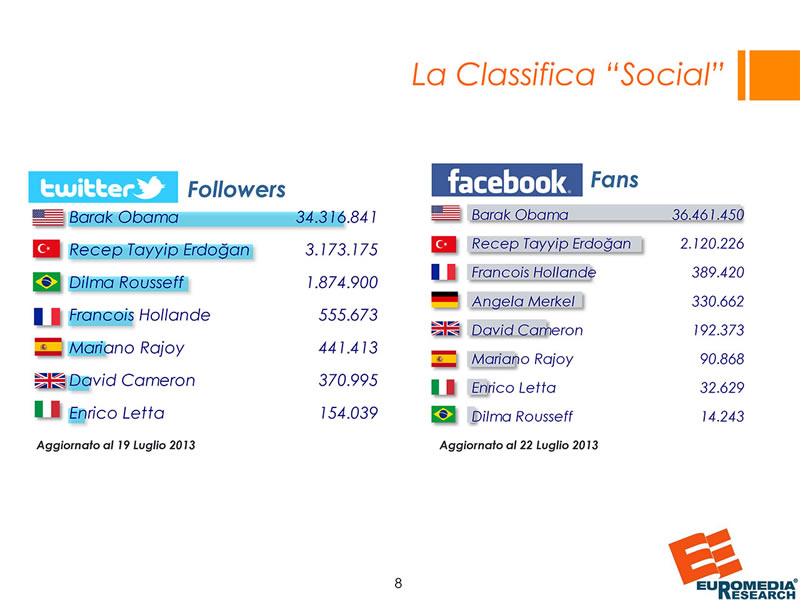
[half]
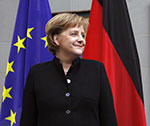 ANGELA MERKEL – GERMANY
ANGELA MERKEL – GERMANY
Merkel came to power in 2005 as the first woman to hold the post of German Chancellor and was re-elected in 2009. Her party, the Christian Democrat Party (CDU), polled 32.6% and subsequently 32%. Forbes magazine rated Merkel as ‘the most powerful woman in the world’. With two months to go before national elections, an opinion poll (FORSA) reveals that 57% expect Angela Merkel to remain chancellor with the CDU actually increasing its share of the vote to 40%, surging clear of its main rivals.
Our general qualitative rating = AAA
[/half]
[half_last]
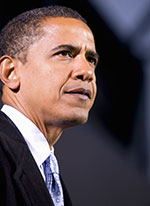 BARACK OBAMA – USA
BARACK OBAMA – USA
Obama made history as the first African American to obtain the highest office in 2008 on 52.9% of the vote. In 2012, 51% of the American electorate backed him for a second time. However, as of June 2013, some opinion polls show a 54% dissatisfaction with the administration, as well as a sharp drop in his personal popularity ratings to 45%. Recently dragged into the so-called “Datagate” scandal (wholesale personal data surveillance inside the USA and within the EU), Obama has lost credibility with the principal European leaders, not helped by his lack of progress on matters such as Syria, the ongoing talks with the Taliban in Afghanistan and the closure of the prison at Guantanamo.
Rating = AA
[/half_last]
[half]
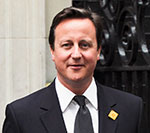 DAVID CAMERON – UNITED KINGDOM
DAVID CAMERON – UNITED KINGDOM
Cameron became the youngest British Prime Minister since 1812 on May 11, 2010, succeeding Gordon Brown’s short premiership. He was forced into a coalition with the Liberal Democrats as his party, the Conservatives, did not achieve an outright majority. In the last two years, his party’s poll rating has decreased and now stands, on average, ten percentage points behind the Labour Party. Reacting to a rise in anti-EU feeling, he has promised, if re-elected in 2015, to hold a referendum on staying in the EU. His championing of gay marriage rights has caused huge splits inside his party but, on the other hand, it has enabled him to garner support from the general electorate.
Rating = BBB
[/half]
[half_last]
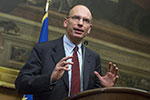 ENRICO LETTA – ITALY
ENRICO LETTA – ITALY
Letta became Prime Minister of Italy on April 28, 2013, at the head of a broad national coalition. A few months on, Italian electors show a good level of trust in their leader’s abilities. He enjoys a satisfaction rating, according to the major opinion poll companies, that hovers around the 50% mark.
Rating = BB+
[/half_last]
[half]
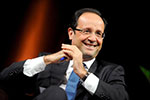 FRANÇOIS HOLLANDE – FRANCE
FRANÇOIS HOLLANDE – FRANCE
Hollande was elected French president on May 6, 2012, gaining 51.6% of the vote in the final runoff against Sarkozy. A year down the road, a TNT survey reveals that 76% of the French people are ‘not at all satisfied’ with the measures his government has taken so far. This feeling of dissatisfaction was even found in 56% of those who previously voted for his socialist party and are now considerably unhappy with his performance.
Rating = BBB
[/half]
[half_last]
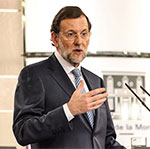 MARIANO RAJOY – SPAIN
MARIANO RAJOY – SPAIN
Rajoy has been prime minister since December 21, 2011 when his conservative party, Partido Popular, gained a 44.62% share of the vote. He is currently embroiled in a corruption scandal dating back to 2009 which is linked to his party. According to national surveys, the Partido Popular’s poll rating is now half what it was at the 2011 general election. Rajoy had won on the back of a general rejection of the anti-austerity measures the previous Socialist leader Zapatero had pushed through, but which Rajoy then proceeded to adhere to after the vote.
Rating = CCC
[/half_last]
[half]
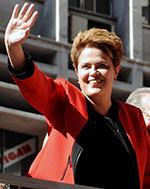 DILMA ROUSSEF – BRAZIL
DILMA ROUSSEF – BRAZIL
Roussef was elected president in 2009; her Workers Party scored 16.9% in the parliamentary elections and 23.1% for the Senate, emerging as the largest party overall. In 2009 Epoca magazine named her one of the most influential women in Brazil. However the recent demonstrations against the Football World Cup in 2014 have caused a drastic drop in her popularity, with one DataFolha poll showing a fall of 27 percentage points, from a high of 57% down to 30% now. What’s more, 25% of Brazilians now believe that the Brazilian government is doing a bad or extremely bad job, whereas before the protests started, this figure had remained stable around 9%.
Rating = CC
[/half]
[half_last]
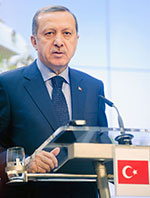 RECEP TAYYIP ERDOGAN – TURKEY
RECEP TAYYIP ERDOGAN – TURKEY
Erdogan became Prime Minister for the first time on March 14, 2003, and subsequently won again in 2007, and triumphed a third time in 2011. His party, the AKP (Justice and Development Party) increased its share of the vote with each election, thus: 34..4% initially, then 46.7% and finally gaining 49.8% the last time around. However, a recent OCR poll showed a slight drop to 41.5% as a direct result of the Taksim Square protests, while another poll (Metropoll) registered a more significant fall to 35.3%. However, despite this decrease, Erdogan’s AKP would still emerge as the leading party in Turkey.
Rating = C
[/half_last]



